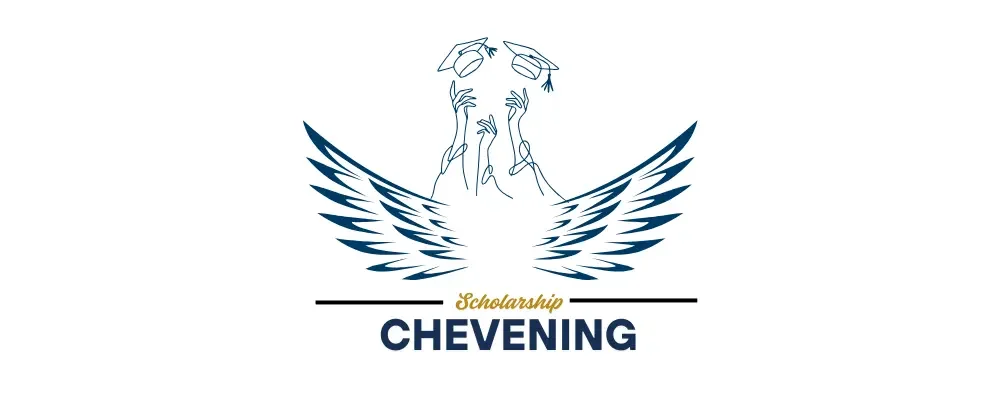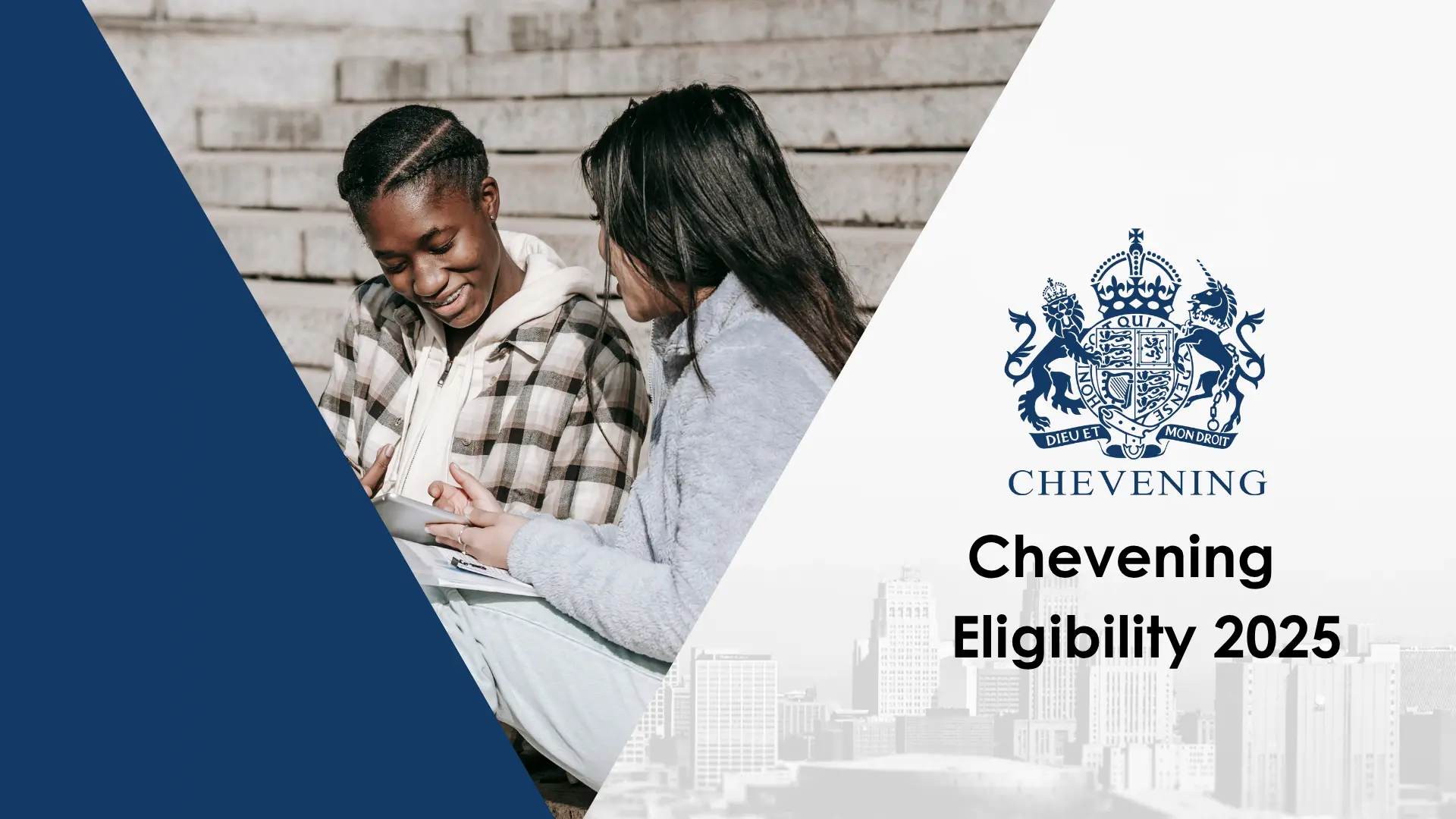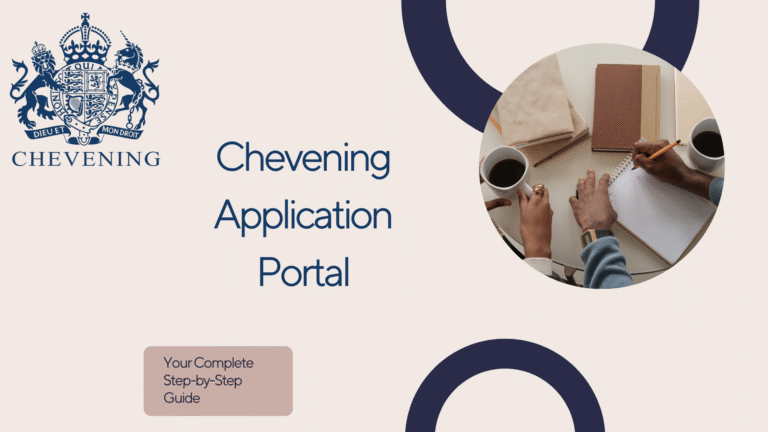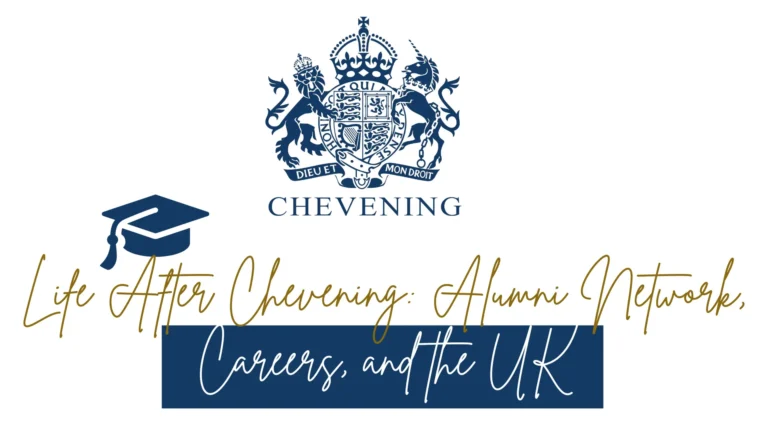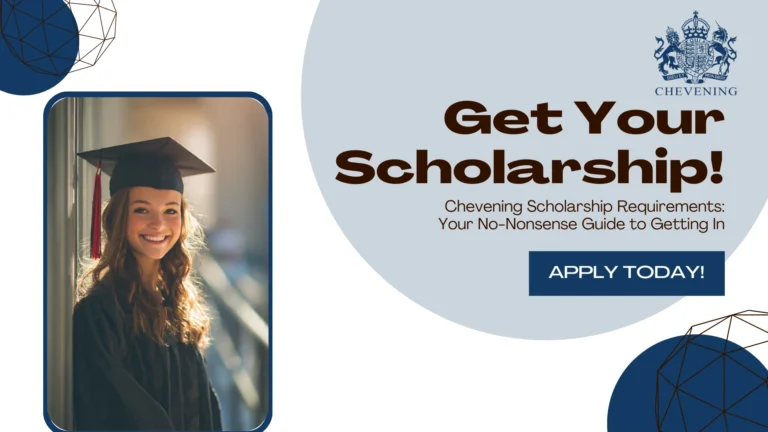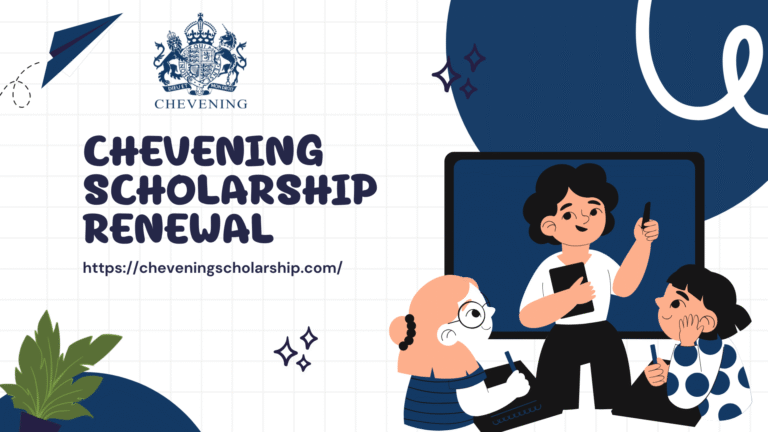Chevening Eligibility 2025: The Complete Checklist (Every Requirement Explained)
Last year, roughly 10,000 people spent weeks crafting Chevening applications only to discover—after submission—that they weren’t eligible in the first place.
Some had dual UK citizenship they didn’t think mattered. Others miscalculated their work hours. A few had already studied in the UK on government funding. These weren’t close calls or gray areas. These were automatic, non-negotiable disqualifications that could have been caught with five minutes of careful reading.
Don’t be those people.
Understanding Chevening eligibility 2025 isn’t complicated, but it requires attention to detail. One missed requirement means months of wasted effort. One misunderstood criterion means automatic rejection regardless of how brilliant your essays are.
So let’s walk through every single Chevening scholarship eligibility criteria requirement for 2025. Not the vague overview from the website, but the specific, detailed, “will I actually qualify” breakdown you need. We’re covering citizenship rules, work experience calculations, education requirements, the return obligation, and all the edge cases that trip people up.
By the end, you’ll know definitively whether you’re eligible. And if you are, you’ll know exactly what documentation you need to prove it.
The Four Non-Negotiable Requirements
Chevening eligibility criteria 2025 consists of four absolute requirements. Miss any one, and you’re out. No exceptions, no appeals, no “but my situation is special.”
Requirement 1: Citizenship
You must be a citizen of a Chevening-eligible country or territory.
The simple version: Check the official Chevening website for the current list of eligible countries. If your country is listed, you meet this requirement.
The complicated version: Citizenship issues are where many people discover they’re ineligible.
Chevening country eligibility 2025 specifics:
✓ You ARE eligible if:
- You hold citizenship of a Chevening-eligible country
- You hold dual citizenship (neither being UK)
- You’re a refugee holding travel documents from an eligible country
- You’re a British Overseas Citizen or British Subject (specific cases)
✗ You are NOT eligible if:
- You hold UK citizenship (or dual UK citizenship)
- You hold dual citizenship with UK as one nationality
- You have indefinite leave to remain in the UK (ILR)
- You hold refugee status in a non-Chevening eligible country
- Your only citizenship is from an ineligible country
Chevening eligibility UK citizens: Clear answer—No. UK citizens cannot apply for Chevening.
Chevening scholarship eligibility UK nationals 2025: Also no. British nationals, citizens, or those with ILR are ineligible.
The dual citizenship trap:
Many people assume that having non-UK citizenship alongside UK citizenship makes them eligible. Wrong. If you hold UK citizenship at all, you’re ineligible. Period.
Chevening citizenship eligibility requirements: You must hold valid citizenship documentation at time of application and throughout the scholarship.
Requirement 2: Work Experience
You must have at least two years (2,800 hours) of work experience.
This is where the most confusion and miscalculation happens.
Who can apply for Chevening 2025 based on work experience:
The 2,800-hour rule:
- 2,800 hours = roughly 2 years of full-time work
- Full-time = 35-40 hours per week
- Can be accumulated over any timeframe
- Must be completed before application deadline
Chevening work experience eligibility 2025 calculation:
| Work Type | Hours Per Week | Weeks Per Year | Hours Per Year | Years Needed for 2,800 |
|---|---|---|---|---|
| Full-time | 40 | 48 | 1,920 | 1.5 years |
| Full-time | 35 | 48 | 1,680 | 1.7 years |
| Part-time | 20 | 48 | 960 | 2.9 years |
| Part-time | 15 | 48 | 720 | 3.9 years |
What counts as work experience:
✓ Definitely counts:
- Paid full-time employment
- Paid part-time employment (pro-rated)
- Substantial paid internships
- Self-employment with verifiable business
- Voluntary work in professional capacity (if substantial)
- Multiple jobs combined (if not overlapping)
- Freelance or consulting work (documented)
✗ Does NOT count:
- Undergraduate work (coursework, projects, research as part of degree)
- Casual volunteering without professional responsibility
- Unpaid internships that were primarily educational
- Student organization positions
- Work done simultaneously with full-time studies (unless you can prove it was additional)
Chevening eligibility without work experience: You cannot apply. The 2,800 hours is non-negotiable.
Chevening scholarship eligibility with no work experience: Not possible. However, if you’re close to 2,800 hours, you can continue working and apply in a future cycle.
Example calculations:
Scenario 1: Straightforward
- 2 years full-time NGO work (40 hours/week)
- Calculation: 2 years × 48 weeks × 40 hours = 3,840 hours ✓
Scenario 2: Mixed employment
- 1 year full-time (1,920 hours)
- 1 year part-time 20 hours/week (960 hours)
- Total: 2,880 hours ✓
Scenario 3: Self-employment
- 18 months running consulting business (40 hours/week)
- Calculation: 1.5 years × 48 weeks × 40 hours = 2,880 hours ✓
- But: Must provide business registration, tax records, client contracts
Scenario 4: Graduate student working
- 2 years of teaching assistantship while doing master’s (20 hours/week)
- Calculation: 2 years × 48 weeks × 20 hours = 1,920 hours
- Insufficient (need 2,800) ✗
Documentation needed:
- Employment contracts
- Salary slips
- Employment certificates from HR
- Tax documents
- For self-employment: business registration, tax returns, client contracts
Requirement 3: Education
You must have an undergraduate degree.
Chevening undergraduate degree eligibility:
✓ You ARE eligible if you have:
- Bachelor’s degree (3-4 years typically)
- Equivalent qualification that allows UK master’s admission
- Combined bachelor’s-master’s degree
- Professional qualifications equivalent to undergraduate degree
- Degree from any country (if recognized)
Eligibility for second master’s Chevening: Yes, you can apply for a second master’s degree. Having one already doesn’t disqualify you.
Chevening eligibility with master’s degree: You’re still eligible. Many applicants already hold master’s degrees and apply for a second one.
What you need:
- Undergraduate degree certificate
- Official transcripts
- Translation if not in English
- Degree must qualify you for UK master’s admission
Educational requirements by country:
Most countries follow standard patterns:
- 4-year bachelor’s = clearly eligible
- 3-year bachelor’s = usually eligible
- 2-year bachelor’s + 2-year master’s = eligible (applying for second master’s)
Check with your chosen UK universities to confirm your degree qualifies for master’s admission. If they accept you, Chevening will accept your educational credentials.
Professional qualifications: Some professional certifications (CA, ACCA, etc.) may qualify if they’re equivalent to an undergraduate degree. This is assessed case-by-case.
Requirement 4: Return Home Requirement
You must return to your country of citizenship for a minimum of two years after your scholarship ends.
Chevening return home requirement 2025:
This is legally binding. Not a suggestion. Not negotiable.
What it means:
- You must be physically present in your home country
- For at least 24 consecutive months
- After completing your Chevening scholarship
- You cannot take UK employment during this period
- You cannot extend your UK visa for work purposes
Why it exists:
- Chevening invests in future leaders who’ll return home
- Development impact in home countries
- Building UK-home country relationships
- Not an immigration pathway
Consequences of non-compliance:
- Required to repay full scholarship amount
- Banned from future UK government programs
- Legal action possible
- Damage to professional reputation
After two years: Once you’ve fulfilled the requirement, you’re free to:
- Apply for jobs anywhere (including UK)
- Pursue additional studies abroad
- Live wherever you choose
- Apply for UK work visas
The two-year clock starts: When your scholarship officially ends (usually September after your master’s completion).
Additional Eligibility Considerations
Age Requirements
Chevening age eligibility 2025:
Official position: No maximum age limit.
Reality:
- Minimum age: Usually 22-23 (need undergraduate + 2 years work)
- Maximum age: None officially
- Most scholars: 25-35 years old
- Over 40: Less common but possible with strong profile
The practical consideration: Your age matters less than:
- Career trajectory and impact potential
- Leadership demonstrated
- Clear goals and return plans
- How scholarship fits your development
English Language Requirements
Chevening English language eligibility 2025:
Official requirement: Adequate English to complete UK master’s program.
How this is assessed:
- Through your application essays
- Interview (if shortlisted)
- University requirements (IELTS, TOEFL, etc.)
Do you need IELTS for Chevening application? No, not at application stage. BUT you’ll need it for university applications (due by July if selected).
Typical university requirements:
- IELTS: 6.5-7.0 overall (varies by university)
- TOEFL: 100+ (varies by university)
- Some universities waive this if your undergraduate was English-medium
Strategy: Take IELTS/TOEFL early (during application phase) so you’re ready if selected.
Country-Specific Eligibility
Some countries have additional considerations or priorities.
Chevening eligibility Pakistan 2025:
- Standard requirements apply
- Pakistan is Chevening-eligible
- High competition (30-40 scholarships, 5,000+ applications)
- Priority sectors may vary year to year
Chevening eligibility India 2025:
- Standard requirements apply
- India is Chevening-eligible
- High competition
- No additional requirements
Chevening eligibility Nigeria 2025:
- Standard requirements apply
- Nigeria is Chevening-eligible
- Multiple interview locations (Lagos, Abuja)
Chevening eligibility Bangladesh 2025:
- Standard requirements apply
- Bangladesh is Chevening-eligible
- Interviews typically in Dhaka
Chevening eligibility refugees 2025: Refugees holding travel documents from eligible countries may apply, subject to standard requirements.
Chevening eligibility ASEAN countries 2025: Most ASEAN countries are eligible. Check official list for your specific country.
Chevening eligibility low-income countries: No special eligibility requirements, but these countries are often strategic priorities.
Common Eligibility Misconceptions
Myth 1: “You need a perfect academic record”
Reality: You need an undergraduate degree that qualifies for UK master’s admission. First-class honors help but aren’t required.
Myth 2: “You need exactly 2 years of work experience”
Reality: You need 2,800 hours. This could be 1.5 years full-time or 3+ years part-time.
Myth 3: “Volunteer work doesn’t count”
Reality: Substantial volunteer work in professional capacity counts. Casual volunteering doesn’t.
Myth 4: “You can’t apply if you’ve already studied abroad”
Reality: Previous international study is fine. What disqualifies you is previous UK study with UK government funding.
Myth 5: “Dual citizenship is fine as long as one isn’t UK”
Reality: True. Dual citizenship is fine unless one is UK.
Myth 6: “The return requirement isn’t enforced”
Reality: It absolutely is. Violations result in repayment requirements and legal action.
The Eligibility Self-Assessment
Chevening eligibility quiz 2025:
Answer these questions honestly:
Question 1: Citizenship Do you hold citizenship of a Chevening-eligible country without UK citizenship?
- Yes → Continue
- No → Not eligible
Question 2: Work Experience Do you have at least 2,800 hours of verifiable work experience?
- Yes → Continue
- No → Not eligible (wait until you do)
Question 3: Education Do you have an undergraduate degree that qualifies for UK master’s admission?
- Yes → Continue
- No → Not eligible (unless completing degree soon)
Question 4: Return Requirement Can you commit to returning to your home country for 2 years after scholarship?
- Yes → You’re eligible! ✓
- No → Don’t apply (violating this has serious consequences)
If you answered “Yes” to all four: You meet basic eligibility. Proceed with application.
If you answered “No” to any: Address that requirement before applying.
Documentation Requirements
Chevening scholarship required documents 2025:
At Application Stage
Required:
- Valid passport or national ID
- Undergraduate degree certificate
- Transcripts showing grades
- Two references (submitted by referees directly)
Not required at application:
- IELTS/TOEFL (needed later for universities)
- Detailed work experience documentation (needed if shortlisted)
- University offers (due by July if selected)
If Shortlisted
Additional documents:
- Detailed employment verification
- Salary slips or proof of income
- Employment contracts
- For self-employment: business registration, tax documents
If Selected
Final documents:
- Unconditional offer from UK university
- IELTS/TOEFL scores
- Complete work experience documentation
- Any requested verification documents
Chevening eligibility verification process: Chevening conducts thorough verification of all claims. Falsified information results in immediate disqualification and potential legal consequences.
Edge Cases and Special Circumstances
Recent Graduates
Can I apply immediately after undergraduate?
Only if you have 2,800 hours work experience. Most fresh graduates don’t.
Timeline for recent graduates:
- Graduate in May 2023
- Work full-time 40 hours/week
- By November 2024: ~3,000 hours
- Eligible for 2025 cycle ✓
Career Changers
Can I apply if changing careers?
Yes. As long as you meet work experience requirements, career changes are fine. Your career plan should explain the trajectory logically.
Entrepreneurs
Does running my own business count?
Yes, if you can document it properly:
- Business registration
- Tax returns
- Client contracts or invoices
- Evidence of hours worked
Multiple Jobs
I have three part-time jobs. Do they all count?
Yes, as long as:
- They don’t overlap time-wise
- You can document each separately
- Combined hours meet 2,800 minimum
Gap Years
I took time off for personal reasons. Am I still eligible?
Yes. Gaps in employment don’t disqualify you. You just need 2,800 total hours at some point.
Changes to Eligibility for 2025
Chevening scholarship eligibility update 2025:
No major changes from 2024 to 2025.
The core requirements remain:
- Citizenship of eligible country
- 2,800 hours work experience
- Undergraduate degree
- Return home commitment
Minor updates:
- Country list may be updated (check official site)
- Some countries may have changed strategic priorities
- Application portal may have interface updates
Chevening eligibility criteria changes 2025: Always check the official Chevening website for any last-minute updates before applying.
Eligibility Checklist for 2025
Chevening eligibility requirements checklist:
Print this and check each item:
Citizenship & Immigration:
- [ ] I hold citizenship of a Chevening-eligible country
- [ ] I do NOT hold UK citizenship or dual UK citizenship
- [ ] I do NOT have UK indefinite leave to remain
- [ ] I have valid passport/travel documents
- [ ] I can legally return to my home country after scholarship
Work Experience:
- [ ] I have at least 2,800 hours of work experience
- [ ] I can document this with employment letters/contracts
- [ ] My work experience is completed (not future plans)
- [ ] I’ve calculated my hours accurately
- [ ] I can explain gaps if any exist
Education:
- [ ] I have completed undergraduate degree
- [ ] My degree qualifies for UK master’s admission
- [ ] I have degree certificate and transcripts
- [ ] Documents are translated to English if needed
- [ ] I can provide verification if requested
Return Requirement:
- [ ] I understand I must return home for 2 years
- [ ] I accept this is legally binding
- [ ] I have realistic post-return plans
- [ ] I’m not using Chevening as immigration pathway
Application Readiness:
- [ ] I have two potential referees identified
- [ ] I can apply to three UK universities
- [ ] I have time to prepare quality application
- [ ] I understand the application deadline
If ALL boxes checked: You’re eligible and ready to proceed! ✓
What to Do If You’re Not Eligible
Chevening scholarship eligibility rejected scenarios:
If You Lack Work Experience
Action plan:
- Calculate exactly how many more hours you need
- Continue working in meaningful roles
- Document everything carefully
- Apply in future cycle when you meet requirement
Timeline example:
- Current hours: 2,000
- Need: 800 more
- Working 40 hours/week
- Time needed: 20 weeks (5 months)
- Apply next cycle ✓
If You Have Citizenship Issues
UK citizenship:
- Cannot be changed for Chevening purposes
- Consider other UK scholarships open to UK citizens
- Look at alternative scholarships (Commonwealth, etc.)
Wrong country:
- If your country isn’t eligible, options are limited
- Some people qualify through refugee status
- Check if eligibility might change in future years
If You Lack Educational Requirements
Action plan:
- Complete your undergraduate degree
- Ensure degree meets UK master’s entry standards
- Get official transcripts and translation
- Apply once degree is confirmed
Strategic Eligibility Considerations
Optimal Timing
When should you apply?
Too early:
- Just meeting minimum work experience
- Limited leadership evidence
- Weak professional network
Optimal:
- 3-6 years work experience
- Clear career trajectory
- Strong leadership evidence
- Established professional network
Too late:
- No maximum age, but…
- Consider whether master’s still serves your goals
- Whether you’re overqualified for the program
Building Eligibility Over Time
If you’re not quite ready:
Year 1:
- Gain more work experience
- Develop leadership evidence
- Build professional network
- Take on challenging projects
Year 2:
- Document achievements
- Quantify impact
- Seek leadership roles
- Build UK academic connections
Year 3:
- Apply with strong, mature profile
- Better chances than minimal eligibility application
Country-Specific Guidance
Chevening eligibility checklist 2025 by country:
For Pakistani Applicants
Chevening scholarship Pakistan eligibility:
- Standard requirements apply
- HEC degree attestation helpful but not required
- Document work experience carefully (Pakistani employers sometimes informal)
- IELTS requirement for most UK universities
- Interview likely in Islamabad, Karachi, or Lahore
For Indian Applicants
Similar to Pakistan:
- Standard requirements
- Very high competition
- IELTS needed for most universities
- Multiple interview locations
For African Applicants
Generally:
- Standard requirements apply
- Priority countries vary by region
- Documentation standards must be met
- Language requirements same
The Bottom Line on Eligibility
Chevening eligibility 2025 boils down to four requirements you absolutely must meet:
- Right citizenship (eligible country, not UK)
- Enough work experience (2,800 documented hours)
- Proper education (undergraduate degree for UK master’s)
- Return commitment (2 years home after scholarship)
Everything else—IELTS, university offers, references—comes later.
If you meet these four requirements, you’re eligible to apply. Period.
Now the question shifts from “Am I eligible?” to “Am I competitive?”
Those are different questions. Eligibility is binary—yes or no. Competitiveness is a spectrum—from long-shot to strong candidate.
But you can only worry about competitiveness if you’re eligible first.
So check your eligibility carefully. Today.
Because the worst waste of time isn’t applying and getting rejected. It’s spending months on an application when you were never eligible to begin with.
Still unsure about your eligibility? Drop your specific situation in the comments and let’s work through it together. The community can help clarify edge cases.
Confirmed you’re eligible? Awesome. Your next step is understanding the full application process and building a competitive profile.
Not eligible yet? Figure out what’s missing, create a timeline to meet requirements, and come back stronger in a future cycle.
Eligibility isn’t the end. It’s the beginning. Make sure you’re starting from the right place.
